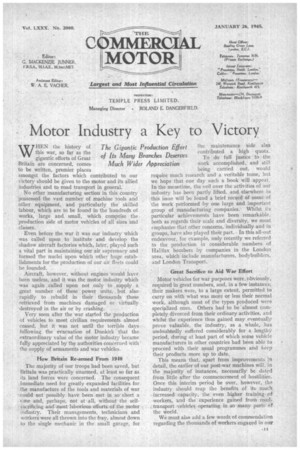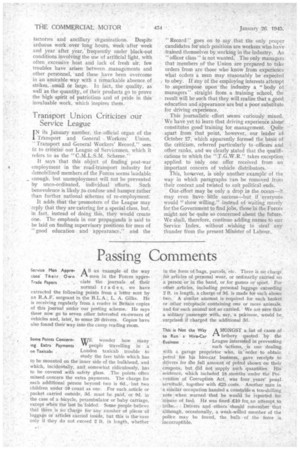Motor Industry a Key to Victory
Page 15

Page 16

If you've noticed an error in this article please click here to report it so we can fix it.
HEN the history of this war, so far as the gigantic efforts Of Great Britain are concerned, comes to be written, premier places amongst the factors which contributed to our victory should be given to the motor and its allied industries and to road transport in general. No other manufacturing section in this country possessed the vast number of machine tools and other equipment, and particularly the skilled labour, which are to be found in the hundreds of works, large and, small, which comprise the production side of motor vehicles of all sizes and classes.
Even before the war it was our industry which was called upon to" institute and develop the shadow aircraft factories which, later, played such a vital part in maintaining our air supremacy and formed the nuclei upon which other huge establishments for the production of our air fleets could he founded.
Aircraft, however, without engines would have been useless, and it was the motor industry which was again called upon not only to supply a great number of these power units, but also rapidly to rebuild in their thousands those retrieved from machines damaged or virtually destroyedin the air or by crashing.
Very soon after the war started the production of vehicles to meet civilian requirements almost ceased, . but it was not until the terrible days following the evacuation of Dunkirk that the extraordinary value of the motor industry became fully appreciated by thg authorities concerned with the supply of armaments and war vehicles.
How Britain Re-armed From 1940 The majority of our troops had been saved, but Britain was practically unarmed, at least so far as its land forces were concerned. The consequent • immediate need for greatly expanded facilities for the manufacture of the tools and materials of war • could not possibly have been met in so short a time and, perhaps, not at all, without the selfsacrificing and most laborious efforts-of the motor • industry. Their managements, technicians and workers were all thrown into the fray, almost down to the single mechanic in the small garage, for the maintenance side, also contributed a high quota.
To do" full justice to the work accomplished, and still being carried out, would require much research and a veritable tome, but we hope that one day such a book will appear. In the meactime, the veil over the activities of our industry has been partly lifted, and elsewhere in 'this issue will be found a brief record of some of the work performed by one large and important group of manufacturing companies. Whilst its particular achievements have been remarkable, both as regards their scale and diversity, we must emphasize that other concerns, individually and in groups, have also played their part.. In this all-out endeavour, for example, only recently we referred to the production in considerable numbers of Halifax bombers by companies in the London area, which include manufacturers, bodybuilders, and London Transport.
Great Sacrifice to Aid War Effort Motor vehicles for war purposes were, obviously, required in great numbers, and, in a few instances, . their makers were, "to a large extent, permitted to carry on with what was more or less their normal work, although most of the types produced were specialized ones. Others had to be 'almost completely divorced from their ordinary activities, and whilst the experience thus gained may .eventually prove valuable, the 'industry, as a whole, has undoubtedly suffered considerably for a lengthY period, during at least part of which some vehicle manufacturers in other countries had been able to proceed with their usual programmes and keep their products more up to date.
This means that, apart from improvements in detail, the earlier of our post-war machines will, in the majority of instances, necessarily be dated from little after the commencement of hostilities. Once this interim period be over, however, the industry should reap the benefit; of its much increased capacity, the even higher training-:of workers, and the experience gained from road: transport vehicles operating. in so many partsof the world.
We must also add a few words of commendation regarding the thousands of workers engaged in our factories and ancillary Organizations. Despite arduous work over long hours, week after week and year after year, frequently, under black-out conditions involving the use of artificial light, with often excessive heat and lack of fresh air, few troubles have arisen between managements and other personnel, and these have been overcome in an amicable way with a remarkable absence of strikes, . small or large. In fact, the quality, as well as the quantity, of their products go to prove the high spirit of patriotism and of pride in this invaluable work, which inspires them.
Transport Union Criticizes our Service League
I/N1 its January number, theofficial organ of the Teansport and General Workers' Union, "Transport and General Workers' Record," sees lit to criticize our League of Servicemen, which it refers to as the " C.M.L.S.M. Scheme."
It says that this object of finding post-war employment in the road-transport industry fin' demobilized members of the Forces seems laudable enough, but unemployment will not be prevented by unco-ordinated, individual efforts. Such benevolence is likely .to confuse and hamper rather than further national schemes of re-employment. It adds that the promoters of the League may reply that they are'catering for a special class, but, in fact, instead of doing this, they would create one. The emphasis in our propaganda is said to be laid on finding supervisory positions for men of "good education and appearance," and the " Record " goes on to say that the only proper candidates for such positions are workers who have trained themselves by working in the industry. An " officer class" is not wanted. The only managers that members of the Union are prepared to take orders from are those who know ,from experience what orders a man may reasonably be expected , to obey. If any of the employing interests attempt to superimpose upon the industry a "body of managers" straight from a training school, the result will be such that they will realize that a good education and appearance are but a poor substitute for driving experience.
This journalistic effort seems curiously mixed. We have yet to learn that driving experience alone constitutes good training for management. Quite apart from that point, however, our leader of. October 27, which apparently formed the basis of the critiasm, referred particularly to -officers and other ranks, and we clearly stated that the qualifications to which the " T.G.W.R." takes exception applied to Only one offer received from an important concern of vehicle distributors.
This, however, is only another example of the way in which paragraphs can be removed from their context and twisted to suit political ends.
Our-effort may be only a drop in the ocean—it may even have little success—but if everyone would "show willing," instead of waiting merely for the Government to find jobs, those'in the Forces might not be quite so concerned about the future. We shall, therefore, continue adding names to our Service Index, without _wishing to steal any thunder from the present Minister of Labour.




















































